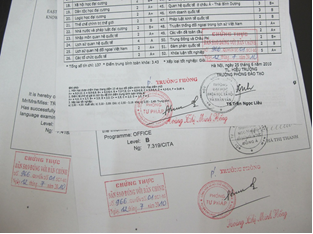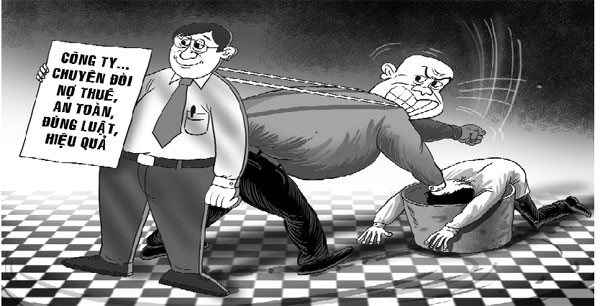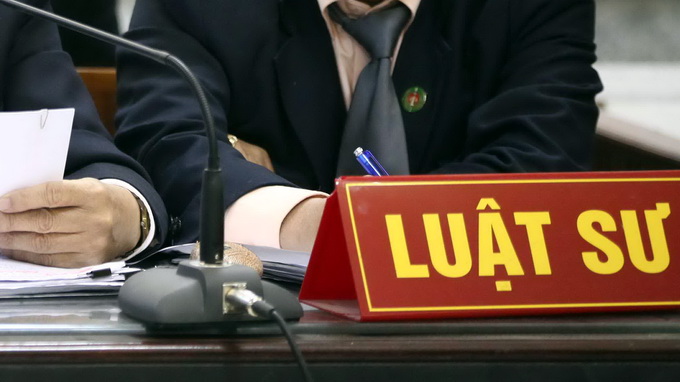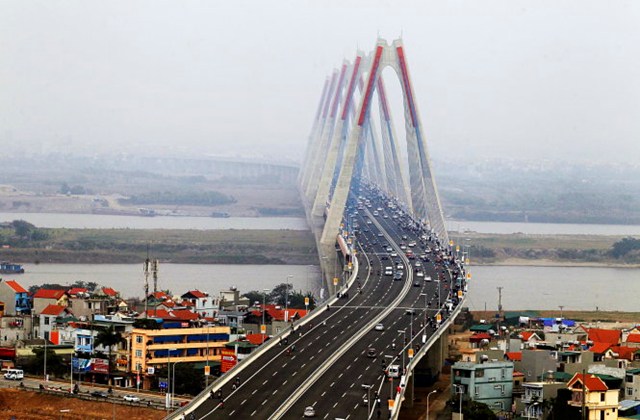The Supreme People's Court of Vietnam issued Official Dispatch 206/TANDTC-PC in 2022, announcing the results of an online response to several issues in adjudication work. This includes addressing 10 issues related to criminal and criminal procedure matters.

Answers to Concerns on Administrative and Administrative Litigation in Vietnam (Image from the Internet)
1. Answers to concerns about merging administrative cases in Vietnam
* Issue:
The A family and the B family have a dispute over the parcel boundary between the two families. During the resolution process, the Chairman of the District C People’s Committee issued an administrative sanction decision for Mr. A’s act of encroaching on the disputed land. Mr. A filed a lawsuit requesting the cancellation of the land use right certificate issued to Mr. B by the District C People’s Committee and the administrative sanction decision of the Chairman of the District C People’s Committee against Mr. A. The court has accepted two different cases. In this scenario, can the Court merge the two cases into one to resolve?
* Answer:
According to the provisions of Clause 1, Article 35 of the Law on Administrative Procedures 2015:
- The Court combines two or more cases that it has separately handled into one to resolve under a single administrative case when the following conditions are met:
a. The separately handled cases involve a single plaintiff against multiple administrative decisions, administrative acts all by one agency or organization or an authorized individual within the agency or organization, which are closely related; or the separate cases involve multiple plaintiffs against the same administrative decision or administrative act.
b. Combining two or more administrative cases into one must ensure swift, efficient, and effective adjudication and not violate the prescribed preparation period for trial.
In this case, the plaintiff is disputing one decision of the District C People’s Committee and one decision by an authorized individual within the same committee. The two decisions are closely related, made by the same body, but only differ in issuing authority (one issued by the committee and the other by its head). Both decisions concern the disputed land area (one decision grants the land use certificate to Mr. B including the disputed area, and the other concerns Mr. A's encroachment on Mr. B's land, which was certified by the District C People's Committee). Thus, to ensure swift, efficient, and effective adjudication, the Court can merge the cases to resolve them collectively.
2. Answers to concerns about the subject of the lawsuit in Vietnam
* Issue:
Mr. Tran Van H submitted a file to convert land use rights at the B Commune People’s Committee according to regulations, but Ms. Nguyen Thi N, an officer of the B Commune People’s Committee assigned to receive land fluctuation registration files, returned the file without stating a reason. Disagreeing with this return, does Mr. H have the right to file a lawsuit? If so, what is the subject of the lawsuit in this case?
* Answer:
In the second paragraph of Clause 2, Article 60 of Decree 43/2014/ND-CP:
... In cases where households, individuals, or community members wish to submit their applications at the Commune People’s Committee where the land is located, the Commune People’s Committee must receive the applications and return the results. In cases of registration of land fluctuations, fixed assets attached to the land; issuance, renewal, or reissue of land use certificates, within three working days from receiving the complete application, the Commune People’s Committee must transfer the file to the Land Registration Office.
Thus, as per these regulations, Mr. H has the right to sue due to the B Commune People’s Committee's non-compliance in receiving and returning the file related to the land administrative procedure.
Clause 5, Article 60 of the Decree 43/2014/ND-CP stipulates:
- The result of handling administrative procedures is as follows:
a) The result must be returned to the land user or owner of assets attached to the land within three working days from the resolution date, except as specified in Point b of this Clause;
b) If financial obligations need to be fulfilled concerning administrative procedures, the land use certificate and other documents related to land are given after the land user provides proof of such completion; in cases where land is leased with annual payment, results are returned after the land lease contract is signed; if exempt from financial obligations, results are returned after the competent authority provides the exemption confirmation;
c) In cases of insufficient application, the receiving agency must return the file and clearly state the reasons for non-resolution.
According to Clauses 3 and 4, Article 3 of the Law on Administrative Procedures 2015, administrative actions refer to actions by state administrative bodies or authorized individuals within such bodies or organizations performing administrative management tasks, fulfilling or not fulfilling duties prescribed by law. Administrative actions subject to lawsuits are those affecting the legitimate rights and interests of organizations or individuals.
Therefore, receiving the file and returning the result of administrative land procedures falls within the responsibilities of the B Commune People’s Committee. Ms. N, an officer of the Committee, returning the file without clear reason infringes upon Mr. H's legitimate rights and interests. This is considered an administrative action by the B Commune People’s Committee, not by Ms. N personally. Hence, the subject of the lawsuit in this case is the administrative action of the B Commune People’s Committee.
3. Answers to concerns about the subject of lawsuits related to national defense in Vietnam
* Issue:
If a plaintiff sues against a decision to revoke land related to a defense project, does the Court have jurisdiction to accept the case?
* Answer:
According to Point a, Clause 1, Article 30 of the Law on Administrative Procedures 2015, non-judiciable claims include:
a) Administrative decisions and acts that pertain to state secrets in defense, security, and diplomacy as prescribed by law.
Therefore, the Court must evaluate evidence to determine whether the land revocation for the project involves state secrets in the defense sector. If not, the Court still has jurisdiction to resolve the case.
4. Answers to concerns about the statute of limitations for filing administrative cases in Vietnam
* Issue:
Clause 2, Article 149 of the Civil Code 2015 states: "The Court shall apply the limitation period as requested by one party or the parties provided the request is made before the Court of first instance issues a judgment or decision." Does the Court apply this provision of the Civil Code 2015 when resolving administrative cases?
* Answer:
Clause 2, Article 184 of the Civil Procedure Code 2015 specifies:
- The Court shall apply the limitation period only upon request from one or both parties, provided the request is made before the Court of first instance issues a judgment or decision.
The party benefiting from the limitation period may waive it unless the waiver aims to evade obligations.
Point e, Clause 1, Article 217 of the Civil Procedure Code 2015 states:
- After accepting a case within its jurisdiction, the Court issues a decision to suspend the settlement of the civil case in the following instances:
...
e) The parties request to apply the limitation period before the Court of first instance issues a judgment, and the limitation period has expired.
Point g, Clause 1, Article 143 of the Law on Administrative Procedures 2015 specifies:
- The Court shall decide to suspend the settlement of a case in the following instances:...
g) The statute of limitations has expired.
Thus, under Point g, Clause 1, Article 143 of the Law on Administrative Procedures 2015, if the statute of limitations has expired, the Court shall suspend the settlement of the administrative case without stipulating that the parties must request the limitation period application as provided in Point e, Clause 1, Article 217 of the Civil Procedure Code 2015.
Hence, in administrative litigation, the Court does not apply Clause 2, Article 149 of the Civil Code 2015 to determine whether to apply the limitation period.
5. Answers to concerns about the confiscation of administrative violation means in Vietnam
* Issue:
A husband uses the family’s passenger car to transport smuggled cigarettes, resulting in administrative sanctions and confiscation of the entire vehicle. The husband claims the transportation was for family income. The wife (with registered marriage) requests half of the vehicle’s value. Is this request admissible?
* Answer:
Article 26 of the Law on amendments and supplements to certain articles of the Law on Handling Administrative Violations 2020 states: "Confiscation of administrative violation means implicates transferring related objects, money, goods, and means directly under state budget resulting from serious administrative violations intentionally committed by individuals or organizations."
Point c, Clause 11, Article 8 of Decree 98/2020/ND-CP prescribes:
Confiscation of transportation means used to ship prohibited goods concerning violations under this Article if the quantity, weight, value, or illicit gain stipulated in Clauses 6, 7, and 8 of this Article, or for recidivism or multiple violations.
Clause 2, Article 27 of the Law on Marriage and Family 2014 prescribes: "Husband and wife bear joint responsibility for obligations stated in Article 37 of this Law."
Clause 2, Article 37 of the Law on Marriage and Family 2014 states: "Obligations performed by either spouse to meet essential family needs."
Clause 1, Article 13 of Decree 126/2014/ND-CP stipulates: "... In cases where either spouse conducts transactions involving common assets to meet essential family needs, it is considered agreed upon by the other side, except cases provided for in Clause 2, Article 35 of the Law on Marriage and Family."
Based on the above provisions, if the husband uses the family’s car to transport contraband cigarettes to the extent that the vehicle must be confiscated, and the proceeds are to meet essential family needs, the wife has no right to claim half the vehicle’s value.
6. Answers to concerns about the duration of temporary urgent measures in Vietnam
* Issue:
The Law on Administrative Procedures 2015 does not specify effective dates for decisions on temporary urgent measures. When does a decision on temporary urgent measures cease to be effective?
* Answer:
Clause 1, Article 75 of the Law on Administrative Procedures 2015 states: "Decisions on the application, change, or cancellation of temporary urgent measures take immediate effect."
Clauses 1 and 2, Article 74 of the Law on Administrative Procedures 2015 stipulate the cases for amending or canceling temporary urgent measures.
Thus, the decision to apply temporary urgent measures only ceases to be effective when there is a Court decision to change or cancel the temporary urgent measures.
The Law on Administrative Procedures 2015 does not specifically regulate cases where there are effective court judgments or decisions, hence, reference can be made to Clause 3, Article 138 of the Civil Procedure Code and Resolution 02/2020/NQ-HDTP, specifically assigning a Judge by the Chief Justice of the Court that issued the decision on temporary urgent measures.
7. Answers to concerns about the expired enforcement request period in Vietnam
* Issue:
The judgment creditor submits an enforcement request, but it is outside the request period specified in Clause 1, Article 312 of the Law on Administrative Procedures 2015. Does the Court have the right to return the enforcement request?
* Answer:
Clause 1, Article 312 of the Law on Administrative Procedures 2015 states: "Within one year from the expiration of the deadline stipulated in Point b, Clause 2, Article 311 of this Law, if the debtor does not voluntarily comply, the judgment creditor may file a request attaching the judgment or decision of the Court and relevant documents, requesting the Court of first instance to issue an enforcement decision.
The judgment creditor must prove that due to objective obstacles (per Clause 13, Article 3 of the Law on Administrative Procedures 2015) or force majeure (per Clause 14, Article 3 of the Law on Administrative Procedures 2015), they could not submit the enforcement request within the time limit. If proven, the time of objective obstacles or force majeure is not included in the request period.
If they cannot prove objective obstacles or force majeure, the Court returns the enforcement request.
Diem My
 Article table of contents
Article table of contents









